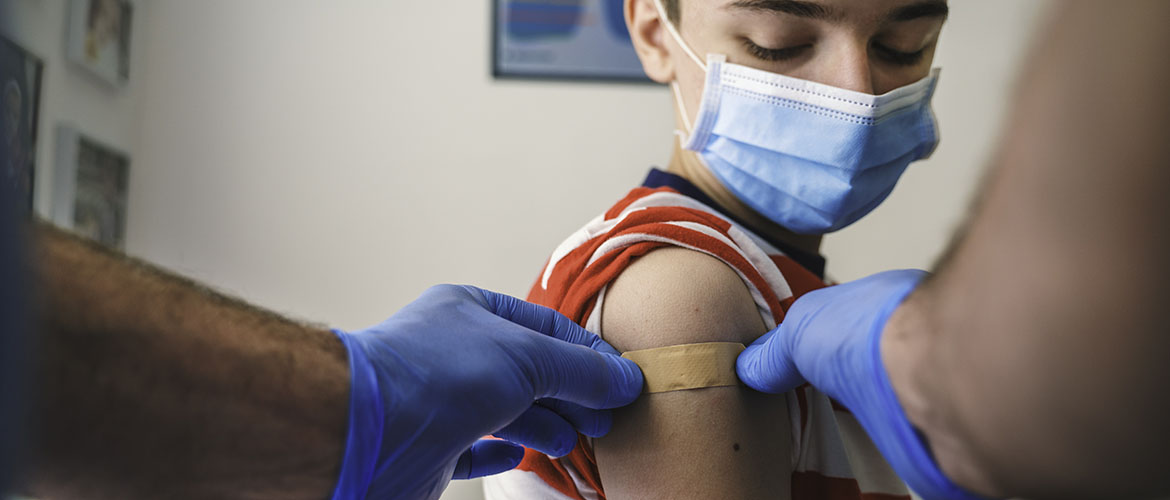Health officials warn a lag in childhood vaccinations during the COVID-19 pandemic could lead to outbreaks of other preventable diseases after school starts in the fall.
Routine vaccinations dropped dramatically early in the pandemic, and although they started picking up last summer, many children and teens still need their shots, the Centers for Disease Control and Prevention found in a recent report. Delays may result in outbreaks of illnesses, including measles, mumps and whooping cough.
“We’ve been able to largely ameliorate many diseases because of vaccinations,” says Dr. David Lechner, head of immunization efforts for Health Care Service Corporation (HCSC) and vice president of health care delivery and chief medical officer of its Montana plan. Because of successful immunization efforts, he says, much of the nation and many new doctors have never experienced the devastation diseases such as diphtheria, polio and measles can cause or recognize them when they reemerge.
"We've been lulled into a sense of security."
“We lose that perspective,” says Lechner, an obstetrician and family doctor. “We’ve been lulled into a sense of security that it is okay to not immunize, which is simply not true.”
To improve vaccination rates, the company and its plans in Illinois, Montana, New Mexico, Oklahoma and Texas are collaborating with state health agencies, providers and community organizations and school districts to bridge immunization gaps, no matter health coverage. New data-sharing systems also are helping the New Mexico and Texas plans better target efforts to vaccinate members.
Higher immunization rates will protect everyone from disease, Lechner says.
“Vaccinations are foundational and fundamental to preventive medicine,” he says, adding the HPV vaccine, for example, can prevent cancer-causing infections and precancers. “Immunizations are key prevention measures, which are the basis for what we do: Prevent disease.”
Better data drives member outreach
Data-sharing systems developed between state health departments, which collect immunization records for all residents, and the New Mexico and Texas plans are leading to more efficient vaccination outreach efforts. The collaborations are allowing those plans to identify and target communications to members in need of immunizations against vaccine-preventable diseases.
These new collaborations allow the plans to track immunizations, no matter where members got them or whether an insurance claim was filed — doctor’s offices, health departments, retail pharmacies or mobile health clinics.
“Immunization tracking has been a terrific tool for us,” says Dr. Leslie Weisberg, HCSC senior executive medical director. “This provides a more focused approach to our outreach.”
After vaccine gaps are identified, customer service representatives notify members, offer vaccine education and determine whether they need assistance finding immunization providers. The plans also share vaccine data with providers and encourage them to reach out to members in need of immunizations.
Mobile clinics reduce barriers
Meantime, HCSC’s five plans will continue to improve access to immunizations through their community outreach teams and the nonprofit foundations and mobile health programs they sponsor. For decades, Care Van and Caring Van programs have partnered with schools, health clinics and community groups to take vaccines and other health services into communities across their states.
For example, the community relations team in Illinois has booked more than 30 back-to-school events that will include no-cost vaccinations and free school supplies. It will hold events at neighborhood community centers in Chicago’s Pullman, Morgan Park and South Lawndale areas, as well as partner with community groups near Chicago, Springfield, Rockford and Peoria.
The New Mexico team plans to support the New Mexico Department of Health’s annual “Got Shots?” campaign to get children vaccinated before school starts.
“Immunizations help prevent disease and keep our children healthy,” says Dr. Wei-Ann Bay, the New Mexico plan’s chief medical officer. “The more children vaccinated, the healthier our communities are.”
The CDC said in its report that preventing new outbreaks of vaccine-preventable diseases “requires a consolidated and coordinated effort among multiple partners to promote catching up and staying up to date on routine vaccinations for children of all ages.”
HCSC’s clinical experts agree.
“The concern for outbreaks isn’t just for primary school,” Weisberg says. “College students are at risk, too. Outbreaks of meningitis b can be devastating for the college-age population. All childhood immunizations are very important. We don’t want to see a resurgence of these diseases.”

